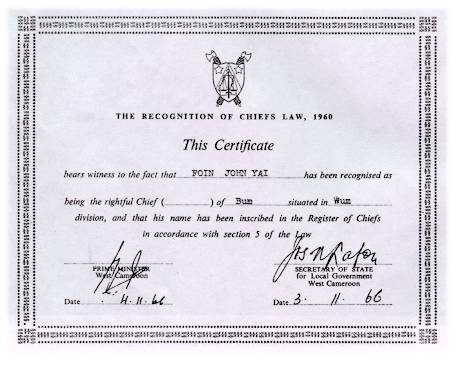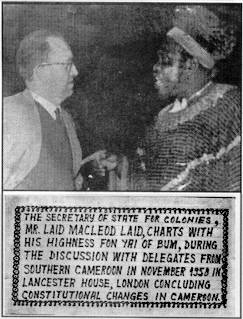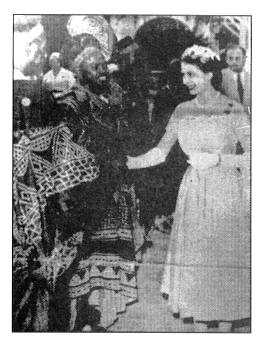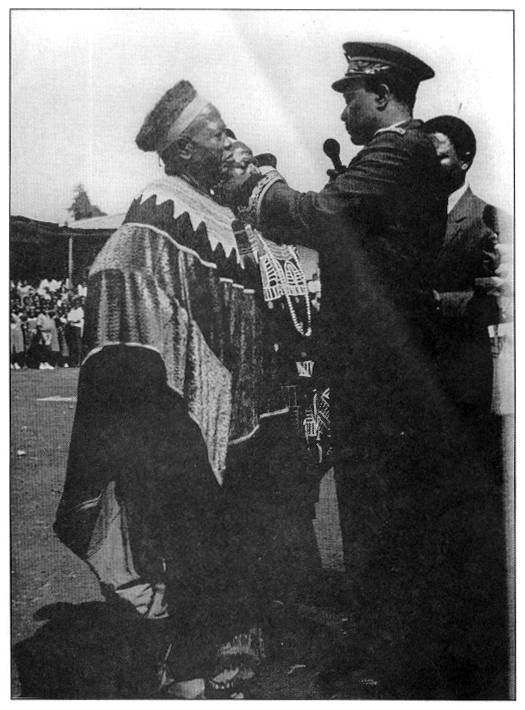Born around 1918, Fon John Yai had formal primary education
in the Bamenda Government School, from where he graduated on December
22, 1937 with a School Leaving Certificate. This qualification earned
him some relative advantages over other Fons of the Bamenda
Grassfields when he subsequently became ruler of Bum in 1954.
 |
When his father Fon Kwanga (popularly known as Tum died, John
Yai was far away from home, in the tin mines in Jos (Nigeria) where
he was working. During his absence Nenembang was on the throne for
two months as regent. He was enthroned on February 12 1954. He
demanded a warrant as permanent president of the court "as his
late father was", which was granted. Capitalising on his late
father's advances and experiences on the path of modernity, he
carried on with the socio-economic transformation of Bum, bringing
his land and people both national and international recognition. Fon
John Yai was among the first Fons to be recognised by the West
Cameroon Government on December 3, 1966, following the Recognition
of Chiefs Law of 1960. |
|
After assuming power in 1954, John Yai adopted as policy to
fight for the liberation of his people and the entire Southern
Cameroon from the shackles of colonial rule. In this regard he became
one of the principal actors in the nationalist struggle. His role in
the struggle also elevated the status and institution of Fondom to one
of the important factors in that struggle from the 1950s.
| In 1956 the Queen of England, Elizabeth II, visited British
Nigeria, but could not proceed to the Cameroons. So Fon John Yai was
among the delegation sent by the Southern Cameroons Government to
welcome her at Lagos and explain to her the case and demands of the
peoples of Cameroon. While in Lagos, the Fon made contacts with some
important British colonial authorities such as the Governor General.
In the speech delivered by their delegation to the Queen, mention
was made of independence for Southern Cameroons. In the follow-up of
this visit to the Cameroons by the Governor General in 1957, the Bum
Native Authority was one of the reception areas. And Fon John Yai,
naturally, was the chief host. Fon John Yai, in his speech to the
Governor General, apart from complaining about the general poor
administrative relations and working conditions of the colonial
subjects, mention was made, for the first time in the open, of the
issue of the reunification of the English and French Cameroons.
Although the Governor General referred the issue to the UNO, Britain
and France, the point had been made, and posterity would appreciate
the pioneer role played by Fon John Yal in redressing the Southern
Cameroons predicament. |
 |
 |
By 1958 Fon John Yai was a member of the Southern Cameroons
House of Chiefs, which had powers of senate. Also in 1958, he was
one of the dignitaries of the Cameroon/Nigeria Delegation to the
U.K. to negotiate for the independence of Southern Cameroons. He
participated in the 1958 Lancaster Agreement on the Constitutional
Arrangement for the Independence of Southern Cameroons. While in
London, he visited famous sites like the Houses of Parliament and
Westminster Abbey, Buckingham Palace, Hampton Court, the Tower of
London, Cambridge University, the British Museum, the Zoological
Gardens, and the National Gallery. In June 1960 Fon John Yai's
efforts in making Bum look modern on the one hand, and in pursuing
the nationalist struggle on the other, were recognised by Queen
Elizabeth II of England, with a certificate for "enlightened
leadership especially in the field of community development and
education". |
| After independence for the Southern Cameroons was achieved in
1961, Fon John Yai started to extend his diplomatic ties with other
traditional and religious authorities of high office in Cameroon.
Since then his daughters have married Fons of different polities in
the Bamenda Grassfields, prominent amongst whom are the Fons of
Mankon, Babungo, Ntundip and Waat, and Ardo Sali of Bum. He has been
very active at various Chiefs' conferences in various capacities. As
a long standing friend and political associate of the late Dr E.M.L
Endeley, Fon John Yai was well known and appreciated by the
Bakweris. In 1993 he was made guest of honour by the Sultan Ibrahim
Mbuombuo Njoya of Bamum in the later's palace in Fumban. During this
visit both monarchs discussed important issues of common interest
and concern. In the area of religion, he, during a Baptist Field
Conference at Songka - Bum, took the sudden decision to be baptized
immediately. The Pastor accepted and he was baptized that same day
November 25, 1990. |
 |
|

